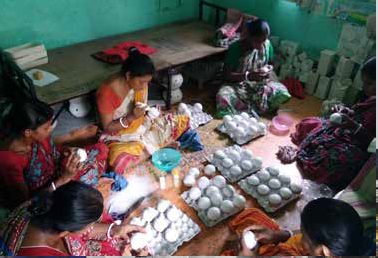
Description of the project: This project ensures a dignified livelihood for women who are scavenging landfills, i.e., recycling municipal solid waste (MSW), in Kolkata by institutionalising their unofficial work and developing women-led microenterprises on waste recycling. Transforming the women to “climate entrepreneurs” leads to social and economic security, as they would otherwise often be exposed to sexual harassment and economic deprivation. The project targets 45,000 poor urban women in Kolkata. It also holds awareness campaigns, and has covered 15,000 households and 500 institutions on sustainable lifestyle and segregation of waste.
Climate impact: Paper, plastic, textile and wet-wastes in MSW are recycled using non water-intensive, low energy technology that needs minimal capital investments and nominal recurring costs. As a climate adaptation project, it works to diminish carbon emission footprints, as well as alleviating urban poverty. Since 2012, the intervention mitigated above 2,500 m tons of MSW (avoiding 7,250 m tons of CO2); generated 1,800 kg of eco-clean biogas; produced 3,700 kg of recycled paper; arrested 4,360 kg plastic in reuse.
Gender impact: 650 women have been identified through a needs assessment, and given extensive training in recycling and infrastructure. 380 women are currently working in small scale MSW enterprises and have access to professional benefits like: insurance, health safety, emergency helplines, paid leave, etc. (following India’s labor law framework). The project protects women’s human rights by preventing sexual and societal abuse, ensures a right to decent work and economic growth (SDG8), and reduces inequalities (SDG10).
Scalability / replicability: This innovative program, with its abatement of landfill emissions and pollution, benefits the citizens of Kolkata. It provides an easy-cost, climate-smart solution. Scaling up has been ensured by the support of 7 local municipal bodies, 28 corporate houses and over 4000 housing societies as partners, donors and practitioners of sustainable lifestyle. Waste management is a common issue in Asia, thus the project has been replicated in: Bhutan, Bangladesh, and transborder Nepal-India.